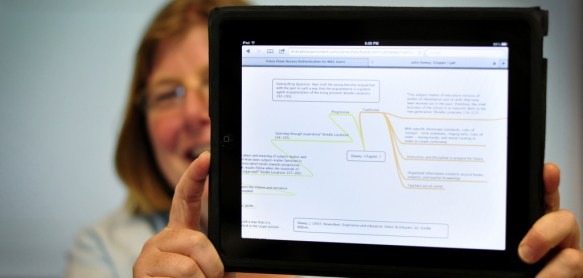UMW professor Teresa Coffman named technology innovator
3 min read
University of Mary Washington
By DAHLIA SOMERS
Teresa Coffman, associate professor of education is the proud recipient of the 2014 Innovative Educator of the Year Award.
Coffman received the award from the Virginia Society for Technology and Education. According to the VSTE, the purpose of the title is “to highlight and recognize innovative educational practices – especially those that champion the smart integration of technology.”
“Dr. Coffman is the consummate life-long learner; she inquisitively stretches beyond her comfort zone, and continues to take delight in new learning experiences,” said Mary Gendernalik-Cooper, dean of the College of Education. “She employs highly constructive skepticism and infectious collegiality in all of her work.”
Each year the VSTE selects exemplary educators from nominations made throughout the state. For 2014, VSTE members and board members and the innovative special interest group elected professors for Teacher of the Year, Leader of the Year and Innovative Educator of the Year.
Gendernalik-Cooper said that she believes Coffman is the perfect representative for Innovative Educator of the Year since she “exemplifies the commitment to innovation and research-based teaching that all CoE faculty members share.”
The recognition can often have positive impacts on the educators’ professional lives.
“It allows me to share best practices and research with students and educators to try new and creative approaches and to think outside of the box in education,” Coffman said. “This is all encompassing around how technologies and innovative thinking play an important role in teaching and student learning.”
The award formally recognizes and celebrates Coffman for her expertise and pedagogy.
As the author of “Using Inquiry in the Classroom: Developing Creative Thinkers and Information Literate Students” and “Engaging Students through Inquiry-Oriented Learning and Technology,” Coffman’s expertise is directed toward educational theory, pedagogy, technology in instruction and teacher preparation.
“Dr. Coffman consistently demonstrates her professional commitment to and passion for innovative teaching that is grounded in compelling research,” Gendernalik-Cooper said. “Most distinctively Dr. Coffman brings these qualities to bear with her students in ways that encourage them to think differently about who they are [becoming] as educators, and how their uses of technologies will shape transformational learning experiences for their own students.”
Currently, Coffman’s work in instructional technology revolves around Google’s Explorer program, specifically on a division that pilots a beta format of Google Glass.
“Specifically, I am exploring the use of wearable technologies as an immersive tool in education and society at large,” Coffman said. “I am also involved in helping to develop Teacher Spot, an online community of practice for teachers in the College of Education at UMW and following graduation.”
In contrast, some viewpoints on an integration of technology in education are less than positive.
Jessica Wu, a junior business administration major thinks that additional technology is not the best direction of money and energy.
“I commend Coffman for the award because she’s trying to utilize Google Glasses in a classroom environment, which is innovative but seems costly,” Wu said. “I didn’t mind Smart Boards in high school, but Google Glasses in college seems the wrong direction to take to improve education. “
Coffman strives for an educational future supported by using the knowledge and tools at hand.
“I am heavily involved in inquiry-oriented learning,” Coffman said. “I critically examine the use of educational technology to engage and motivate students in the learning process, both at UMW and in the global educational community.”


